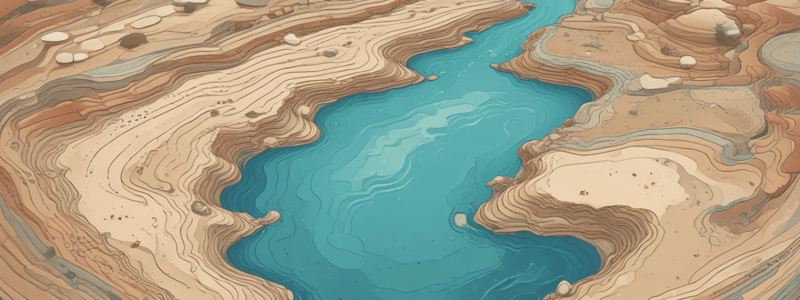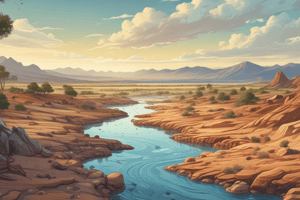Podcast
Questions and Answers
What percentage of Earth's liquid freshwater is made up of surface water?
What percentage of Earth's liquid freshwater is made up of surface water?
- 1% (correct)
- 10%
- 20%
- 5%
Why does sand absorb water more easily than clay?
Why does sand absorb water more easily than clay?
- Because clay has a higher density
- Because sand has a smaller particle size (correct)
- Because sand has a larger particle size
- Because sand is more porous
What is the term for the region where groundwater completely fills all open spaces underground?
What is the term for the region where groundwater completely fills all open spaces underground?
- Water table
- Unsaturated zone
- Soil moisture zone
- Saturated zone (correct)
What is the purpose of aquifers in the water cycle?
What is the purpose of aquifers in the water cycle?
What can you observe when you dig a hole and reach the saturated zone?
What can you observe when you dig a hole and reach the saturated zone?
What is the term for the boundary where the saturated and unsaturated zones meet?
What is the term for the boundary where the saturated and unsaturated zones meet?
Where is one of the world's largest aquifers located?
Where is one of the world's largest aquifers located?
What is the result of groundwater heating up due to a near-surface magma source?
What is the result of groundwater heating up due to a near-surface magma source?
Why do natural ecosystems depend on groundwater?
Why do natural ecosystems depend on groundwater?
What is the function of groundwater in the formation of sedimentary rocks?
What is the function of groundwater in the formation of sedimentary rocks?
What is the term for funnel-shaped cavities in the ground that occur when groundwater is removed?
What is the term for funnel-shaped cavities in the ground that occur when groundwater is removed?
What is the result of pumping too much groundwater out of an aquifer?
What is the result of pumping too much groundwater out of an aquifer?
What is the term for large open spaces underground, similar to sinkholes but without the sinking of the ground above?
What is the term for large open spaces underground, similar to sinkholes but without the sinking of the ground above?
Why do plants and animals depend on groundwater?
Why do plants and animals depend on groundwater?
What is the term for very large caves that are especially amazing because they sometimes connect to other underground caves and caverns through underground tunnel systems?
What is the term for very large caves that are especially amazing because they sometimes connect to other underground caves and caverns through underground tunnel systems?
Flashcards are hidden until you start studying
Study Notes
Groundwater
- Groundwater makes up most of Earth's liquid freshwater, while all streams, lakes, rivers, and ponds only make up about 1% of it.
- When it precipitates, the ground absorbs the water like a sponge, with sand being very good at soaking up water and clay and rocks being worse.
Saturated and Unsaturated Zones
- Groundwater completely fills open spaces underground in the saturated zone, making it literally saturated with water.
- The unsaturated zone has moisture but doesn't completely fill the open spaces, and the boundary between the two is called the water table.
The Role of Groundwater
- Groundwater is an important component of the water cycle, with water that soaks into the ground sometimes coming back out above ground in other locations.
- Much of the world's groundwater is stored in aquifers, which are underground water reservoirs, usually made of rock like limestone.
- The Ogallala Aquifer in the Great Plains of the U.S. is one of the world's largest aquifers, stretching from South Dakota to Texas and from Colorado to Arkansas.
Aquifers and Water Cycle
- Aquifers hold so much water that they take a very long time to fill, sometimes thousands or even millions of years.
- Groundwater acts like a cementing agent, helping sedimentary rocks form by carrying sediments along with it and gluing them together over millions of years.
Effects of Groundwater
- Geysers are the result of groundwater being heated by magma, building up pressure, and eventually escaping at the surface.
- Natural ecosystems depend on groundwater as a source of freshwater for surface water systems, like wetlands and rivers.
- Both plants and animals depend on groundwater, with plants taking it up through their roots and animals using it as a source of drinking water.
Human Dependence and Consequences
- We pump groundwater not only for drinking but also for agricultural irrigation.
- However, pumping too much groundwater can lead to land subsidence, causing sinkholes to form as the ground sinks to fill the empty space.
- Groundwater also dissolves rock underground, creating caves and caverns.
Studying That Suits You
Use AI to generate personalized quizzes and flashcards to suit your learning preferences.




